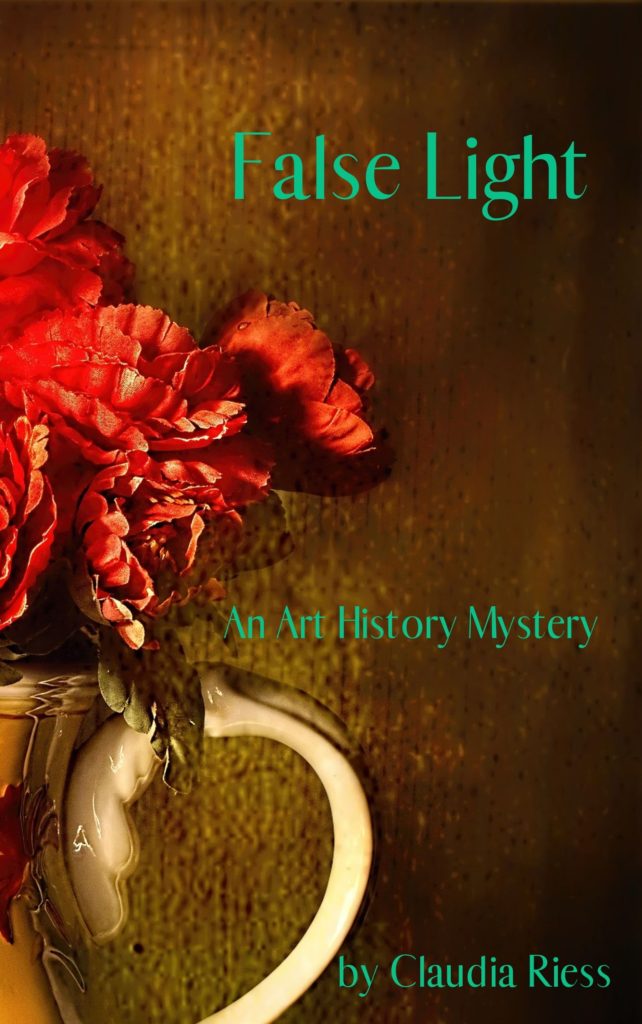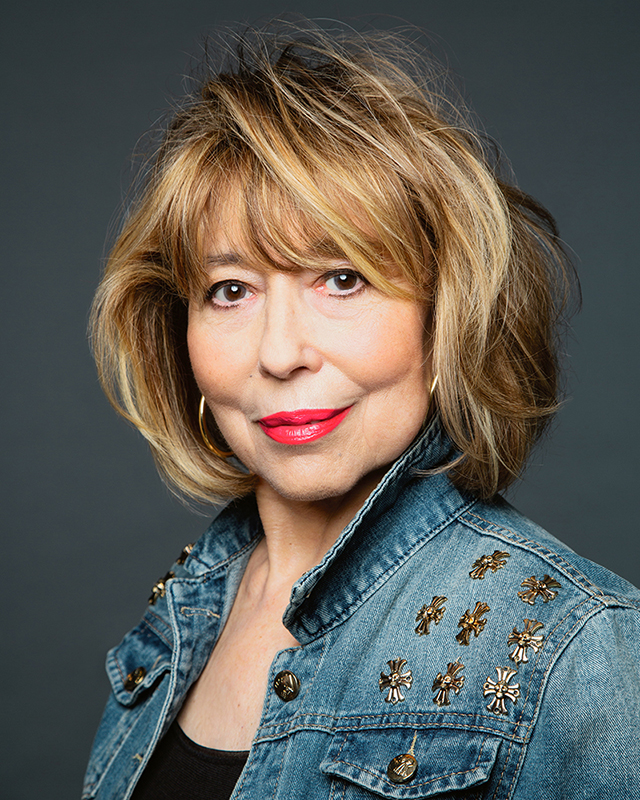
https://goddessfishpromotions.blogspot.com/2020/04/nbtm-false-light-by-claudia-riess.html

Author Interview: Claudia Riess
1. How did you choose your genre? What made you write this book?
I love art, mystery and romance and wanted to explore all three. The notion of “genre” was secondary. For efficiency it’s labeled mystery, but it’s really hybrid. What sparked Stolen Light, the first book in the art mystery series was an offhand remark by my brother, an art historian, about the possibilities of unearthing a presentation drawing or cartoon fragment of Michelangelo’s Battle of Cascina. The idea instantly brought to mind a conversation I’d had years with ago with a college mate, who spoke of her father’s sugar plantation in Cuba having been confiscated during the Cuban Revolution. I reconfigured events, made the plantation owner an art enthusiast whose art collection is looted during an incident shrouded in a mystery that resurfaces six decades later. Enter Erika Shawn, a young art magazine editor and Harrison Wheatley, a more seasoned art history professor, who find themselves thrown together in an academic sleuthing adventure that turns deadly and a burgeoning romance with hazards of its own. What pressed me into writing False Light, the second book in the series, is two-fold. I was hooked on tackling adventures in the art world, where man’s most sublime aspirations conflict with its basest, and Erika and Harrison were insisting that I allow them to get on with their lives.
2. Writers write what they know, and must observe the world. Are you a first-born, middle or last child and how does this shape your view of the world?
I’m a first born. However, for the first ten—formative—years of my life I was an only child, the center of the universe; my parents’, at any rate. As the exclusive recipient of their attention, I was read to for uninterrupted spans at bedtime, escorted to piano and dancing lessons, trips to the beach and museums, zoos and playgrounds. Luckily, at the same time I was being doted on, I was being encouraged to think freely and to view the world with neither dark nor rose-colored lenses, but clearly. We used to sit around the kitchen table eating crackers and cheese and debating (sometimes loudly) ideas on the meaning of the universe. I was given a copy of Will and Ariel Durant’s The Age of Reason to pore over. There was a kind of innocent romance to all this, I mean the kind that precedes but nevertheless seeps into one’s attitudes and expectations of adult relationships. I think the association, early on in my life, of lively discussion and free inquiry, especially in the company of my caring parents, made me feel safe to freely inquire and explore in my writing.
3. Where is your favorite place to write?
At my cluttered desk, which sits near a bank of windows overlooking the East River. When I’m proof-reading, editing, or typing up passages scribbled on legal pads, I glance out at the lovely view and am refreshed. When I’m about to be immersed in a scene unfolding, a dialogue heating up, I want to insulate myself in my little workspace. I pull down the shades.
4. How do you feel about killing your darlings, and what do you do with the remains?
You mean brilliant ideas that just won’t fit into a scene or jam up a sentence? I’m getting better at tossing them. A few get saved for what I kid myself into thinking will be a more appropriate environment. Later I take a second look and realize, oh, here’s a rambling bit of self-aggrandizement. Or not another expository remark sure to slow down the plot. Bye bye.
5. You are introduced to your favorite author. Who is it, and what is that one burning question you must ask them?
Hard to choose, so I’ll stick with the first one who comes to mind: David Mitchell. I’d really like to ask him about the creative process that went into the production of “The Ghastly Ordeal of Timothy Cavendish,” a lengthy excursion in his novel, Cloud Atlas. This is the most hilarious stretch of writing I’ve ever come across. I cried with laughter until my sides hurt. Was it necessary for the riff to have gone on for so long? Who cares. I have several questions about it. I’m not sure which burns the most. I would ask Mitchell if he was laughing throughout the writing or was he stone cold sober. I would ask if he could not stop himself from going on and on with it, or was he in total control of its pace and duration. I would ask if the first draft was even longer, but his editor had him cut it down, and if so, did he put up a fight or willingly yield.
6. Indy 500 – Do you know how to get where you’re going or do you drive the speed limit?
I drive over the speed limit in spurts. When I know where a scene is headed and the GPS is entered, I race ahead. When a character decides to override the directions, I swerve, then hopefully regain my composure and race ahead. When I hit a bump in the road—a plot glitch, an awkward sentence—I generally pull off to the side of the road and fix it. Sometimes I slow down to a snail’s pace as I mull over a problematic image or a fresh idea. At those times, I may grab my pad and pen from the door pocket and blindly scribble a couple of words to remind me what I should deal with later. There can be a good bit of lurching during those intervals. You wouldn’t want to be in the passenger seat.

False Light: An Art History Mystery
by Claudia Riess
~~~~~~~~~~~~~
GENRE: Mystery
~~~~~~~~~~~~~
BLURB:
Academic sleuths Erika Shawn, art magazine editor, and Harrison Wheatley, a more seasoned art history professor, set out to tackle a brain teaser. This time the couple—married since their encounter in Stolen Light, first in the series—attempt to crack the long un-deciphered code of art forger Eric Hebborn (1934-1996), which promises to reveal the whereabouts of a number of his brilliant Old Master counterfeits. (Hebborn, in real life, was a mischievous sort, who had a fascination with letters and a love-hate relationship with art authenticators. I felt compelled to devise a puzzler on his behalf!) After publication of his memoir, Drawn to Trouble, published in 1991, he encrypts two copies with clues to the treasure hunt. On each of the title pages, he pens a tantalizing explanatory letter. One copy he sends to an art expert; the second, he releases into general circulation. The catch: both books are needed to decipher the code.
When the books are at last united 25 years later, Erik and Harrison are enlisted to help unearth their hidden messages. But when several research aides are brutally murdered, the academic challenge leads to far darker mysteries in the clandestine world of art crime. As the couple navigate this sinister world, both their courage under fire and the stability of their relationship are tested.
~~~~~~~~~~~~~
Excerpt:
Erika would not permit herself to sleep. She gave in to her selfish body only to allow it to lean its skull and spine against the wall as she went over, again and again, the day’s nightmare. Reliving it kept the memory raw; healing, impossible.
There was a light tapping on the door. She didn’t know how long she had been sitting there, only that the scant light in the room had dimmed. There was another tap.
“Miss Erika? May I come in?”
It was Grace. Erika had never heard the woman’s supplicating tone of voice, but who else could it be? “Grace?”
“Yes, Miss. Please, may I?”
A kind of dull curiosity moved her to answer, “Come in.”
Grace opened the door and entered the room. She was holding a tray, bracing one side of it with her forearm. She turned the knob with her free hand and shut the door, then better secured the tray. “I’ve brought you some cream of tomato soup and a muffin. You need some nourishment. Would you turn on the light? You wouldn’t want this old lady to trip, would you?”
Grace’s gentle prodding was so uncharacteristic that it caused Erika to rise to her feet and obey, as if to the command of a hypnotist. She clicked on the wall light and took the tray from Grace.
“Where should I put it?”
Grace scurried to the vanity table and pushed aside Erika’s pads and pens. “Right here is good.”
Erika did as she was told. Grace pulled out the chair from the vanity and reached up to touch Erika’s shoulder. “Now sit and have some soup.” She smoothed her scalloped white apron overlaying her starched black dress and stood there, waiting.
“I’m not hungry, Grace.”
“You don’t want to be hungry, but you are,” Grace said, without budging.
There seemed to be no choice but to heed Grace’s first prompt. Erika sat down. She had no intention of lifting the spoon provided. “Thank you.” She waited for Grace to exit the room.
Grace wasn’t going anywhere. She strode to the desk and dragged the desk chair to the vanity, placing it directly alongside Erika’s chair. She sat down. “You must take care of yourself—for yourself as well as your husband,” she said. “He loves you so. I have never seen him so distraught.”
“Harrison will be fine,” Erika said, staring straight ahead.
Grace shook her head. “Not if you aren’t.” She took Erika’s hand in her own. “I haven’t been very cordial to you. I apologize.”
“Apology accepted,” Erika said, feeling nothing.
“I have no children,” Grace said. “I worked for Harrison’s grandparents for fifty years. I’ve known Harrison all his life, and he is family to me; my only family. He is a dear man, but terribly naïve. It broke my heart to see his first wife take advantage of him. She nearly destroyed him. I was afraid you might do the same.”
“I won’t.” She withdrew her hand from Grace’s.
“I know you won’t. I see how you are with him. I see how you look at him.
My prejudice made me blind to this, but now I see.”
Erika turned to Grace. “I’m empty, Grace. Do you see that?” She returned her focus to the wall.

AUTHOR Bio and Links:
Claudia Riess, a Vassar graduate, has worked in the editorial departments of The New Yorker and Holt, Rinehart, and Winston and has edited several art history monographs.
https://www.goodreads.com/author/show/3052782.Claudia_Riess
https://www.instagram.com/claudiariessbooks/
Buy Link:
The book is on sale for only $0.99 during the tour.
A great post and sounds like a great mystery read.
Thanks so much, Mary!
Great post, I enjoyed reading it!
Thanks again, Victoria!
Thank you, Danita, for featuring my book!
It’s a pleasure to have you here, Claudia! Congrats on False Light!
Beautiful cover! Sounds like a must read! Thank you for hosting.
Thank you again, Caryl!